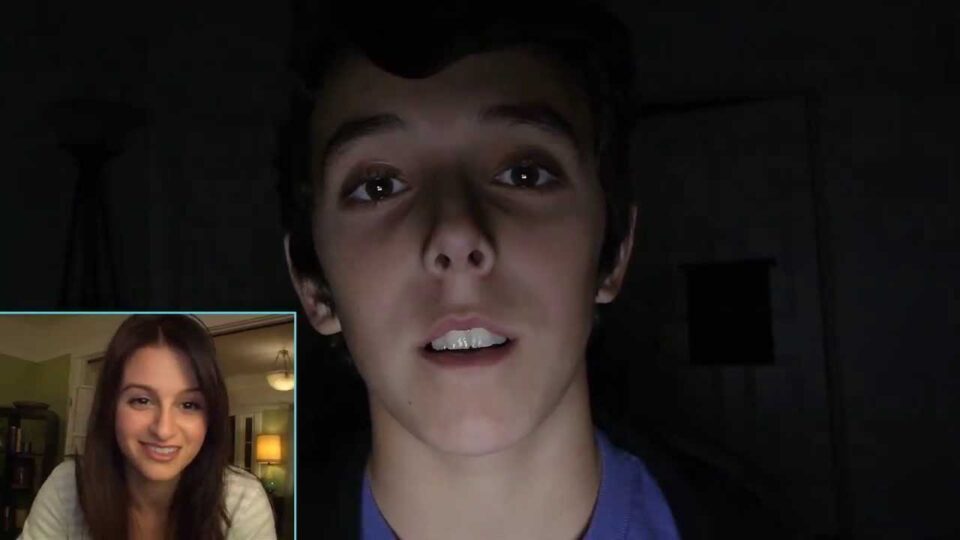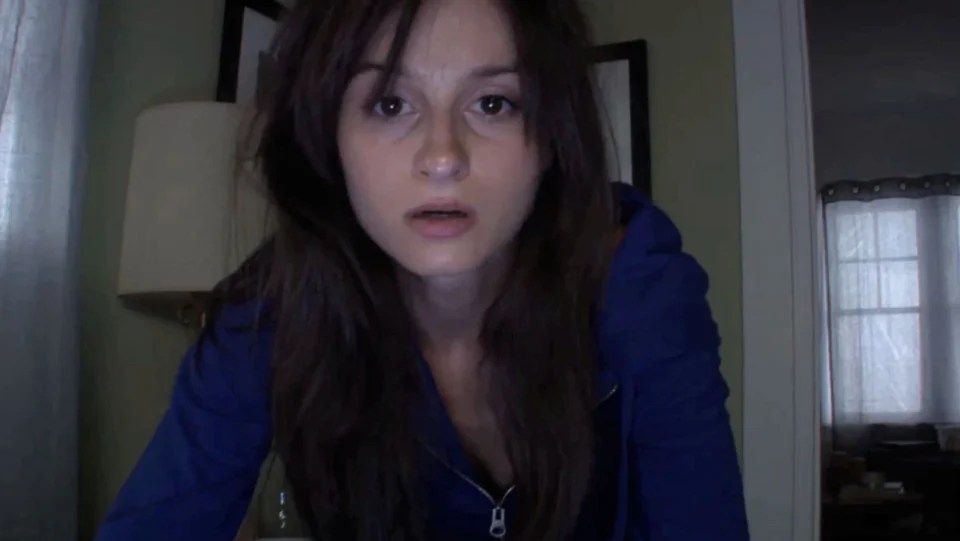‘The Den’ Embodies Fear in the Digital Age

Believe it or not, Zachary Donohue’s The Den turns 10 years old this year. While it didn’t see a stateside release until spring 2014, it premiered in Russia in the dead of winter. Since then, it has cultivated quite a cult following and resides alongside other essential screen life films like Unfriended for its horrifying thrills and high-tech social implications. There’s a real-world fear of being hacked or spied upon that makes the film a truly terrifying experience, as you’re drawn into a dark web underworld where even the most mundane conversations can lead to your demise. Donohue doesn’t hold back when it comes to scaring you in a primal sense: that your death is someone else’s cheap entertainment.
Melanie Papalia plays Elizabeth, a young woman seeking a grant to launch a research project into online culture and human behavior. She plans to interact “with as many people as possible” through a website known as The Den. Think of a fictionalized version of ChatRoulette or Omegle. She’ll collect conversations, videos, and text, and hopefully produce results that give her an insightful glimpse into human interaction. Her professor Sally Winters (Saidah Arrika Ekulona) convinces the board to greenlight the project, and Elizabeth is awarded a handsome grant for her work.
The Den operates on the condition of voyeurism, as users scroll through the site looking for companionship. In the early days of her research, Elizabeth video chats with countless other curious users. Some conversations are normal enough, and others are just plain weird, graphic, and sexually explicit. Donohue uses this plot point to explore the sheer vastness of the internet, from aspects of anonymity to the notion that literally anyone can access the most vulnerable among us. While it may not be the wild, wild west of the late ‘90s with AOL and MSN chat rooms, it’s perhaps even more frightening now in 2023.
When Elizabeth connects with a user named Pyagirl*16, whose laptop camera mysteriously doesn’t work, things take a very dark turn. The chat seems pretty innocuous at first, nothing out of the ordinary. But it all unravels after Pyagirl*16 shares audio of what seems to be someone gagged and tied up, trying to scream. Elizabeth’s blood runs cold. It’s only after she witnesses the young girl’s actual murder that it all becomes far too real.
With such mystery surrounding the dark web (you hear stories…), you wonder how true-to-life something like this really is. The dark web, which can only be accessed through an anonymizing browser like Tor, hosts a hotbed of illicit content, from the selling of drugs and bank account information to computer hacking. The very idea that live streams of real murders could be taking place in the sticky basement of the internet is enough to send goosebumps down the spine. It’s only known through hushed whispers and private chats about what goes on in the darkest corners of the dark web. But do you really want to know?

Elizabeth is about to find out for herself. After viewing Pyagirl*16’s murder, Elizabeth quickly takes the video footage to the police, but they quickly shrug it off. While it may appear real, a cop says, it’s all likely a hoax, and she need not worry. Dismayed, Elizabeth makes it her mission to get to the bottom of the grisly video clip and enlists the help of her friend Max (Adam Shapiro) to trace the video’s origins. However, the IP address pings off other IP addresses, making it near impossible to find the source.
In the modern era, it’s not unheard of that police investigations are unable to pinpoint the whereabouts of criminals in the same way. People even vanish without a trace, kidnapped or something else just as unspeakable. While her search for answers takes her further into the abyss, her boyfriend Damien (David Schlachtenhaufen) goes missing following a business trip.
Too far gone to turn back, Elizabeth burrows further into The Den, hoping to find a crumb about the real identity of Pyagirl*16. All the while, her research is derailed indefinitely一after someone hacks her video camera, records her having sex, and emails the video to everyone in her contacts, including her professor and advisor. Such an invasion of privacy hits close to home for millions of people all around the world. Even as recently as last year, security experts discussed how to protect yourself against cyberattacks and hacking, suggesting a “physical device” like a Post-it note or a camera cover to safeguard against peeping toms.
Most of us are already carrying around potential recording devices in our pockets. With the advent of smartphones, as well as countless social media apps, we’ve all but given permission to have our daily lives recorded. Kavya Pearlman, CEO and co-founder of XR Safety Initiative, a company that specializes in privacy and security for virtual reality and other settings, worries that we’ve already driven over the cliff where no one cares. She says,
“What happens to our privacy when these [webcam] covers are just completely a historical phenomenon, and nobody cares anymore because everything is recorded anyway? We’re moving into this culture where the question of ‘Should I have a mechanical cover to shut off any camera that could be spying on me?’ is moot.”
Elizabeth seems unconcerned about leaving her laptop open and her camera uncovered during the night. That proves detrimental to not only her research but her life. Sally then puts a permanent freeze on the project一but Elizabeth is determined to keep going. To make matters worse, her search into the whereabouts of her boyfriend proves just as futile, and no one will take her seriously.
When Max also disappears, Elizabeth again goes to the cops, but they don’t believe the seemingly tall tale she’s spun. ANd again, she’s left to fend for herself. Unable to trust anyone, it’s up to Elizabeth to untangle the web before she too falls prey to an underground group who get their kicks from inflicting pain on others.

The Den continues spiraling from there. The anonymous group circles around her life, plucking everyone from her close network, including her best friend Jenni (Katija Pevec), before pouncing and capturing her. When we see Elizabeth next, she’s chained inside a dirty and dank bunker (a room straight out of Saw) and is forced to chat with Damien, also tied up, and watch a replay of Max’s death.
What is real and what is fake lies in the heart of The Den. The promise of anonymity entices the most disturbed individuals to whip out their credit cards and pay for “narratives,” otherwise known as someone’s life and eventual murder. Once Elizabeth meets a grisly end, the terror begins anew with another fresh face, Brianne, who previously chatted with Elizabeth earlier in the film. The camera pans out to reveal a middle-aged man entering his credit card details to follow her “narrative,” a sick and twisted decision as it is. His son enters the frame, and the film quickly cuts to black.
Since its beginnings in Cannibal Holocaust and The McPherson Tape, found footage has long sliced into the digital age with a scalpel’s edge. In whatever form, from clunky video cameras to iPhones, black screens capture fear in its most animalistic state. The Blair Witch Project, a benchmark release, brought the horror of being watched into the modern era. The raw quality invites the audience to take a first-person POV unlike any other form in the genre. You can’t obtain such dread in any other format.
Like its predecessors, The Den casts a hypnotic spell on the viewer and you even begin questioning the nature of the film’s reality. How does someone succumb to such unimaginable depravity? What effect does social media and online presence have on one’s ability to discern morality from corruption? And what is it about anonymity that’s so alluring?
These questions circle the mental drain. As Elizabeth’s search for truth continues, the audience must confront these inquiries and uncover their own truth buried deep within. Depravity and anonymity vine together, feeding off one another as a suckling does its mother, and therein lies the dangers of the internet. Donohue, an expert director, nosedives into the thick of the underbrush to present a demented tale about social media’s havoc on her life.
Nestled between the reeds of anonymous Twitter users spewing hateful invectives and spam bots asking for money, there emerges an even greater darkness that consumes our everyday lives. And those deranged enough exploit our desperation to find connection and validation online. The Den magnificently portrays the terror that’s lurking around every corner of the internet, a digital playground that harbors the most wicked things you could possibly imagine. Your downfall is really just a click away.
Categorized: Editorials News
